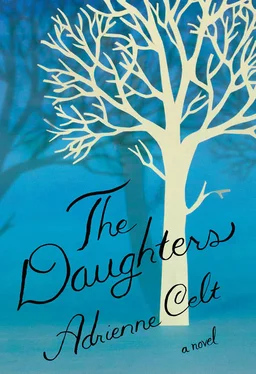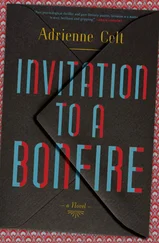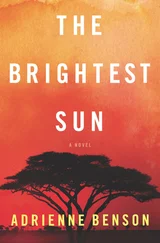I want to explain myself, but where to begin? Kara has begun whimpering too, and taking a ragged breath, I shush her. Brush a few drops of water off her cap where snowflakes melted. The bookstore man watches as I dry myself off, digging in my purse for a napkin that I use to wipe my eyes and blow my nose, after first dabbing Kara’s face. When it seems like the danger of my bursting into renewed tears has passed, he looks down at the open book in front of him and the sheet of paper beside it, which is filled with tabulations. He jots something down with a pencil, but then looks back up at me. I’m still there.
“Is there someone I can call for you?” he asks. I shake my head.
“Actually, if you don’t mind me using my phone in here, I can call.” I pull out my cell phone and show it to him, as if to prove I’m not lying, and he looks around us at the empty store.
“Not like there’s anyone to bother.”
He turns back to his book, flipping through the pages and skimming, now and then licking his index finger for traction. I seem to disappear, which suits me fine.
In the back of the store, behind a tall bookshelf, I find a chair — faded upholstery tacked onto unpolished cherrywood, with curling armrests like cat paws — and I sit, gratefully. Kara lies against me. A store like this would be a nice place to take a sleeping baby sometime. I could pick titles off the shelves and read long passages in this very chair, waiting to see if the words lived up to whatever price the man had penciled into his books. An ordinary world — what must that be like?
As I arrange myself, the chair lets up puffs of dust. The cushions seem too skinny for that, but apparently they have unseen depths. Like everything.
I know what to do. Who to call. I flick through the numbers on my phone, trying not to think what a strange portal it is, a sort of witchcraft. The phone, like the chair, feels thin and insubstantial. But it can bring me all the way across the world. Take the dust of my voice to an ear so far in my past that, by rights, it should be as deaf as stone.
“Hello?” I speak immediately when the line connects.
“Hello?” Echo. Silence. “ Hello?”
Her voice is so familiar, I could cry.
“Mama,” I say. “It’s me.”
The woods encroached on Greta’s home — through the lumber, through every window and crack. But they also belonged to her, and she to them. Her people were always killed in the manner of forest creatures; they died as they lived — struck by lightning, poisoned by a corrupted stream, lost in a field of identical birches that confounded a wanderer’s sense of direction. People in town said Greta came from nowhere, that she’d been found by a hunter bundled up on the ground and had for the most part raised herself. And for that reason or for some other, she continually slipped back into the woods on rambling walks that led her nowhere.
People also said she pulled trouble behind her wherever she went, but for a long time that was just talk, it wasn’t true. Not until she was a grown woman making choices for herself and asking for the things she wanted. Wishes are dangerous things, you see. Start asking the sky to grant you requests and you better prepare for some fallout, red rain.
When a fifth daughter had bloomed within her and faded, this was when she made the deal. The baby lasted long enough inside her to inspire a new glimmer of hope, and to bring a new type of devastation when it was born early, blue and still. Greta insisted on digging the grave herself, and taking the girl far away from her home. She was worried that the voices of the lost girls were getting too loud, and that no child would ever be able to hear past them. She was insensible to protests — deaf to Saul’s urging to stay in bed, to the midwife’s painstaking explication of the volume of blood she’d lost in labor. Greta took the small raisin of a body and wrapped it in clean blankets with the face left bare. Even close up it was difficult to tell the child wasn’t just sleeping.
Greta strapped this parcel to her chest with a long cotton shawl, leaving her hands free to carry a shovel. She allowed Saul to put an apple in her pocket, a crust of bread, and then she kissed the boys on the tops of their heads and walked into the forest, snapping small twigs beneath her feet.
She walked all day. In truth she had no notion of where she was going, what she was looking for. Occasionally she caught a hint of a song on the wind — naturally, she thought she was imagining it. But with no other guiding light to follow, she turned her ear to the sound and walked towards it. By noon she’d consumed the apple and tossed the skinny core beneath a bush. By nightfall she was curled up beneath a tree guarding the waxen infant with the curve of her body.
When the sun came up, Greta found herself in a small clearing full of light blue flowers. She couldn’t remember seeing them the night before, though of course it had been dark then, black shadows dripping down from the sky. Now she was covered in dew, her clothing wet and her hair hanging in damp strings. She blinked in the light and spent a moment rubbing color into her cheeks, cricking her back. There was a baby asleep beside her.
“I’m afraid not.”
Greta started at the voice but made an effort to retain her composure. A creature that sneaks up on you in the dead of the woods is usually only as dangerous as you make it. Keeping her body poised, she turned her neck to peer behind her. Some ten feet away, just outside the clearing, a man stood, leaning against a tree. He was bathed in shade, with only one leg peeking out into the full light. When he noticed this, the man pulled the leg back, turning his body monochromatic.
But Greta had seen the color of his suit, gray as the ashes from an old fire. Familiar.
“Do we know each other?” she asked.
“Perhaps.” The man turned so his spine lay against the tree and his weight rested on his heels. “We may have, once.”
He began to whistle, as though he had all the time in the world and this was the most ordinary interaction he could have dreamed up. Almost dull. But the sound sent a thrill through Greta’s body, her lungs constricting, heavy and cold.
“I’ve heard that song before,” she said.
“Well.” The man smiled at her, a half smile. “It’s not uncommon, is it? The kind of song you might hear at a pub.” He whistled another few bars. “Or a dance.”
A cool wind blew across the clearing, bending stalks of vegetation into sway-backed petitioners. Greta let her weight rest on one hand and listened to the familiar music rebound from rocks and trees. She hummed along, just a little. Remembering Saul’s hand in the concave of her back.
The body of her child lay tranquil beside her on its bed of flowers and grass. During the night the child’s skin had taken on a bluish hue — peaked, freezing — and, unthinking, Greta tried to warm her. Ran a finger over the small forehead, felt the cheeks with her palms. But the child didn’t stir. She just lay there, skin smudging slightly where it was touched.
Greta shivered. When she looked up, the sun had gone behind a cloud and the man was stooping right beside her. His hair was white blond, his eyes slightly lined, as if from squinting.
“Well,” he said again, nodding at the shovel. “Aren’t you going to get on with it?”
What could she do? What else was there to do? Accepting the hand the man held out to her — a clean hand, with trimmed nails and pink skin — Greta hauled herself to her feet and picked up the spade.
“I think,” the man said, “that anywhere around here will do.”
Greta’s shoulders heaved each time the shovel sliced the ground, calling forth a cold chink from the soil. She wanted a hole deep enough to muffle her own grief, if such a hole could be had. Soon she was standing in a pit up to her ankles, then her knees. The dirt grew cooler the deeper she went, a chill seeping out from the earth and into Greta’s skin. The man just watched, rocking back and forth on his heels.
Читать дальше












